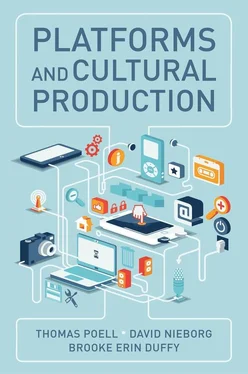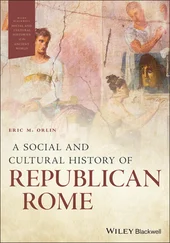Every effort has been made to trace all copyright holders, but if any have been overlooked the publisher will be pleased to include any necessary credits in any subsequent reprint or edition.
For further information on Polity, visit our website:
politybooks.com
The development and rapid uptake of digital platforms like YouTube, TikTok, Instagram, and WeChat are profoundly reconfiguring cultural production around the globe. Indeed, recent transformations in the cultural industries are staggering: longstanding – or “legacy” – media organizations are experiencing tremendous upheaval, while new industrial formations – live-streaming, social media entertainment, and podcasting, to name but a few – are evolving at breakneck speed. Platform companies such as Facebook, Google, and Tencent may not impact every industry segment or region equally; some are barely impacted at all, but when they are, changes tend to be swift and drastic. What follows is our attempt to make sense of these changes, while being mindful of the continuities with earlier forms of cultural production.
Although our names appear on its cover, this book is very much the outcome of an ongoing series of conversations with a global network of scholars and students. Collaborating with colleagues in workshops, conferences, and special journal collections made writing the book not just a process of creation, but an equally inspiring means of learning. Hence, it seems only fitting to start by briefly recounting this process.
The project began as an attempt by two of us to develop a conceptual framework to study what we call “the platformization of cultural production” (Nieborg & Poell, 2018). When discussing our respective research on games and news production, we noticed that the uptake of digital platforms like Facebook and Apple’s app store was triggering similar shifts in the creation, distribution, marketing, and monetization practices of these two industries. Yet, we could not find a comprehensive approach that allowed us to study and explain such changes across these industry segments. We could, however, draw relevant insights from three research traditions: software studies, critical political economy, and business studies. By bringing these literatures into conversation with one another, we developed our initial framework to study how cultural producers organize their operations around platforms , foregrounding changes in markets, infrastructures, and governance.
Owing to the substantial institutional variation between different paths of platformization, Thomas and David invited Brooke, Stuart Cunningham, and Robert Prey to join them on a panel dealing with platforms and cultural production at the 2017 Association of Internet Researchers (AoIR) conference in Tartu, Estonia. Sharing their respective research on the influencer economy, social media entertainment, and the music industry, these panelists helped to demonstrate that, while platformization involves similar changes in markets, infrastructures, and governance, there are also marked differences in how cultural producers become – what we started referring to as – platform-dependent (Poell et al., 2017). More importantly, this conversation demonstrated the limits of our initial conceptual framework to account for such variation; in particular, it overlooked the particular labor, creative, and democratic practices that emerge in platform-dependent modes of cultural production.
To broaden the scope of inquiry, Brooke joined the project. The three of us decided to solicit research on a wide variety of industry segments and geographical contexts, as well as on the gendered, classed, and racialized specificity of platform-dependent modes of cultural production. We were fortunate that Zizi Papacharissi, editor-in-chief of Social Media + Society , agreed to host two special collections in the journal, which gave us a productive forum through which to vastly expand the conversation concerning the relationship between platforms and cultural production. The response to our call for papers far exceeded our expectations. Given the diversity of contributing scholars, as well as the urgency of the topic at hand, we sought to bring the authors together to discuss a first full draft of their papers. Hence, in October 2018, we convened at the McLuhan Centre for Culture and Technology in Toronto. In the intimate setting of the Centre’s historical Coach House, surrounded by old images and book covers from Canada’s famed media theorist, we spent two intense days exchanging ideas, soliciting guidance, and providing feedback. These critical discussions proved enormously productive in bringing the papers into conversation with each other. After a year-long process of revisions and external peer review, the twenty-six contributions were published in two special collections of Social Media + Society , in November 2019 and August 2020 (Duffy et al., 2019; Nieborg, Duffy, Poell, 2020).
The collections were specifically focused on the industrial creation, distribution, marketing, and monetization of cultural content. The articles, moreover, spanned a wide range of segments and genres that included live-streaming, booktubing, game and app development, music streaming, podcasting, social media content creation, webtoons, internet-distributed television, public service media, and the digital vintage economy, among others. The geographic terrain covered was similarly diverse and involved instances of cultural production across Australia, Canada, Chile, China, Germany, Italy, Japan, Mexico, the Netherlands, Poland, South Korea, Spain, Sweden, the UK, and the US. Both roused and energized by our interactions with these contributors and their work, we realized that we needed to take this project to its logical conclusion; hence, the idea for this book was born.
Our ambition with this book is to advance the theoretical framework we introduced in our initial New Media & Society article published in 2018. This framework is developed further in the first half of the book and is now recast as an institutional perspective on platformization. At the same time, we are committed to doing justice to the wide variety of emerging cultural practices that can be observed across platforms and regions of the world. These emerging practices are just as much part and parcel of the processes of platformization as are institutional changes in markets, infrastructures, and governance. From the perspective developed in the second half of the book, platformization involves vital shifts in practices of labor, creativity, and democracy in the cultural industries. Overall, the book aims to provide researchers and students working at the intersection of platforms and the cultural industries with a comprehensive framework to systematically examine and compare the particular industry segments and practices that they are studying.
We are thankful to the many colleagues and students who made this journey with us. We would like to express our gratitude first and foremost to a number of colleagues who generously helped us with their critical comments and generative ideas: Amanda Lotz, José van Dijck, Bernhard Rieder, and Dwayne Winseck. We are also thankful to our students, especially Maggie MacDonald and Ouejdane Sabbah, who read and commented on the first draft of the manuscript. Furthermore, we would like to thank the contributors to the Social Media + Society special collections, who provided us with new insights and rich case studies on which to draw: Arturo Arriagada, Sarah Banet-Weiser, Sophie Bishop, Tiziano Bonini, Robyn Caplan, Aymar Jean Christian, Samantha Close, David Craig, Stuart Cunningham, Faithe Day, Mark Díaz, Stefanie Duguay, Karin van Es, Maxwell Foxman, Alessandro Gandini, Tarleton Gillespie, Alison Hearn, David Hesmondhalgh, Emily Hund, Francisco Ibáñez, Mark R. Johnson, Ellis Jones, Daniel Joseph, Ji-Hyeon Kim, Jeroen de Kloet, Tamara Kneese, Jian Lin, Jeremy Wade Morris, Annemarie Navar-Gill, Victoria O’Meara, Michael Palm, William Clyde Partin, Chelsea Peterson-Salahuddin, Caitlin Petre, Robert Prey, Andreas Rauh, Marc Steinberg, John L. Sullivan, José Miguel Tomasena, Cynthia Wang, Jamie Woodcock, Chris J. Young, and Jun Yu.
Читать дальше












